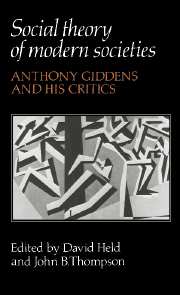Book contents
- Frontmatter
- Contents
- List of contributors
- List of abbreviations
- Editors' introduction
- 1 Social theory as critique
- 2 Hermeneutics and modern social theory
- 3 The theory of structuration
- 4 Models of historical trajectory: an assessment of Giddens's critique of Marxism
- 5 Capitalism, nation-states and surveillance
- 6 War and the nation-state in social theory
- 7 Only half the story: some blinkering effects of ‘malestream’ sociology
- 8 Citizenship and autonomy
- 9 Presences and absences: time–space relations and structuration theory
- 10 Space, urbanism and the created environment
- 11 On the (ir)relevance of structuration theory to empirical research
- 12 A reply to my critics
- Select bibliography
- Index
Editors' introduction
Published online by Cambridge University Press: 24 November 2009
- Frontmatter
- Contents
- List of contributors
- List of abbreviations
- Editors' introduction
- 1 Social theory as critique
- 2 Hermeneutics and modern social theory
- 3 The theory of structuration
- 4 Models of historical trajectory: an assessment of Giddens's critique of Marxism
- 5 Capitalism, nation-states and surveillance
- 6 War and the nation-state in social theory
- 7 Only half the story: some blinkering effects of ‘malestream’ sociology
- 8 Citizenship and autonomy
- 9 Presences and absences: time–space relations and structuration theory
- 10 Space, urbanism and the created environment
- 11 On the (ir)relevance of structuration theory to empirical research
- 12 A reply to my critics
- Select bibliography
- Index
Summary
We live in societies which are undergoing rapid social, political and economic change. Since the advent of industrial capitalism in eighteenth-century Europe, traditional forms of life have been swept away or transformed by a continuous process of industrial and political development. The transition from the pre-industrial societies of early modern Europe to the modern industrial order is a process that preoccupied many of the social and political theorists of the nineteenth and early twentieth centuries. Marx, Weber, Durkheim, Comte, Simmel, Tönnies: these and other thinkers have left us with an array of ideas, a diverse corpus of concepts and generalizations, of philosophical assumptions and methodological precepts, which continue to animate debates within the social sciences. Some of the contributions of these earlier thinkers undoubtedly remain relevant today, but in other respects their ideas have been eclipsed both by intellectual criticism and by the course of events. In social and political theory, as in other domains of the social sciences, there is a need for the ongoing renewal and imaginative reconstruction of concepts, assumptions and approaches, in order to take into account, analyse and understand the key characteristics and developmental trends of modern societies.
Among contemporary social theorists who are preoccupied with this activity of reconstruction and renewal, Anthony Giddens stands out as a figure of major significance. Since the early 1970s he has published nearly a dozen books which have had a profound impact on debates within social theory and the social sciences generally.
- Type
- Chapter
- Information
- Social Theory of Modern SocietiesAnthony Giddens and his Critics, pp. 1 - 18Publisher: Cambridge University PressPrint publication year: 1989
- 2
- Cited by

